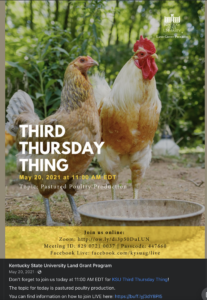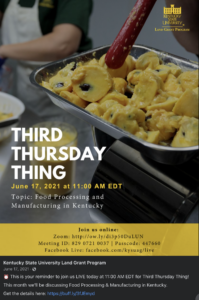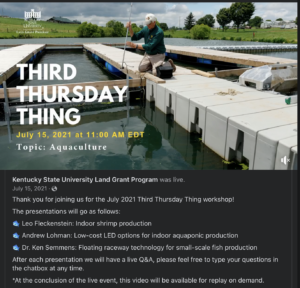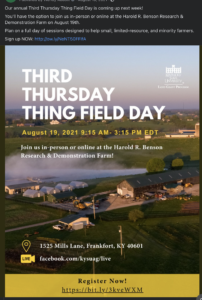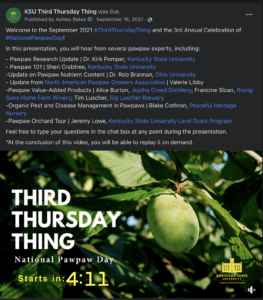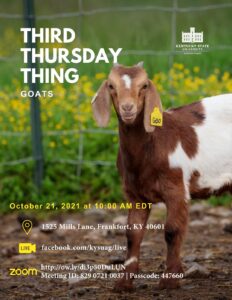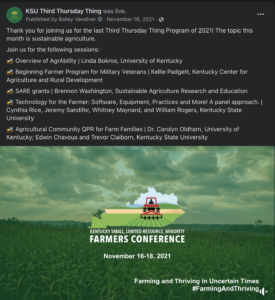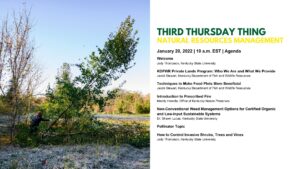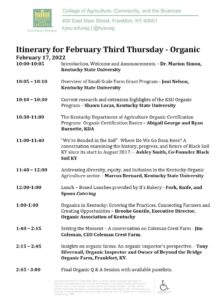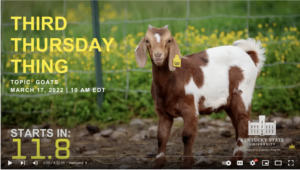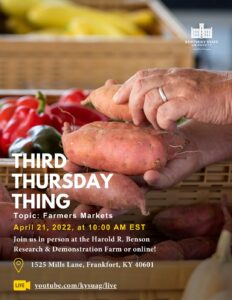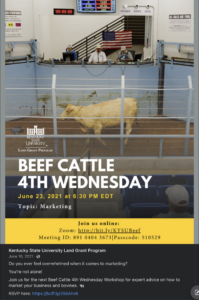Final report for SKY21-002
Project Information
The Third Thursday Thing features monthly sustainable agriculture training sessions. The sessions take place at the Kentucky State University Harold R. Benson Research and Demonstration Farm on the third Thursday of every month with no session in December. Agricultural Professionals and farm leaders throughout the commonwealth and surrounding states are the target audience for the trainings. These trainings are structured for multiple learning types, with lecture style presentations followed by hands on demonstration/activities. We have also added a Fourth Wednesday program based on requests from the agricultural community and are exploring the addition of a Women in Sustainable Agriculture Group. We are also including funds to support some of our KSU agents to seek professional development in sustainable agriculture.
Third Thursdays have become an institution in Kentucky professional development educational programming. The broad range of topics (listed in a later section) ensure that agricultural professionals and producer leaders have training in the skills necessary on a diversified small farm. TTT also serves as a space for synergies in small farm education. Many conferences and educational meetings are planned around “Third Thursdays” including:
o the Annual Small, Limited-Resource/Minority Farmers Conference,
o the International Pawpaw Conference,
o the Regional SARE Goat Project’s Collaborator Conference,
o the SRRMEC Regional Conference on the “Risk-Assessed Business Planning for Small Producers” curriculum, and many others.
Note that the funds in Kentucky are split into Kentucky State University funds and University of Kentucky funds. The two programs work together, though each has slightly different but complementary goals. Third Thursday Thing is one of the premier sustainable agriculture training programs in the state. It serves producer leaders, extension and other ag outreach providers in the state by offering up-to-date, timely information on a variety of sustainable agriculture topics. It meets two of the most pressing needs in Kentucky sustainable agriculture: the need for regular, relevant, basic production and marketing information, and a place for agricultural professionals to seek professional development and connect with growers and other clientele.
KSU’s target audience is a blend of Extension, NRCS, research, and governmental personnel. We also place strong emphasis on professional development of producer leaders in the community who are poised to share the information learned at the Third Thursday Thing with many of their neighbors. We engage in Focus Group feedback throughout the year, and we collect and analyze attendance data to ensure that we are recruiting a balanced group of attendees. For the UK portion, our focus is on developing the capacity of our technical assistance professionals in the state. In our experience these groups do not have abundant funding to support their continued professional development in the field of sustainable agriculture. The main objective of these efforts is for these professionals to acquire knowledge, skills, and networks that allow them to better serve their clientele.
The University of Kentucky’s program is this year focusing on equity and building the capacity of our agriculture professionals to meet the needs of diverse communities of growers as well as those with varying abilities. We plan to do this through three primary projects. The first seeks to train agents in the best way to support Recovery Gardens—a novel and growing practice seeking to improve quality of life in rural communities and expand awareness of sustainable agriculture practices to new audiences. The second project also seeks to train agents and ag outreach providers on how to better serve the needs of potential AgrAbility clients. The current AgrAbility network though very successful, is centralized and minimally staffed. This effort will help to mobilize the decentralized technical support network in the state to improve agricultural access for those with disabilities or other abilities. The final effort seeks to sustain our support of professional development opportunities for non-University agriculture outreach providers.
2021 Kentucky SARE MSP Revised Objectives:
- Expand offerings related to equity in the field of sustainable agriculture
- Expanding professional capacity of agriculture professionals in supporting producers of all physical ability levels.
- Continue providing financial support for the professional development of non-university ag service professionals in the governmental and non-governmental spheres.
- Continue to offer the basic science-based information on sustainable agriculture production and marketing.
2020 (Previous Year) Kentucky SARE MSP Objectives:
- Provide specific professional development activities for non-university ag outreach providers
- Evaluate more clearly how these activities translate into grower outreach
- Build a broad base of interest and skills in agricultural sustainability among extension agents and other professionals in the state
Advisors
- (Educator and Researcher)
- (Educator)
- (Educator)
- (Educator)
- (Educator)
- (Educator and Researcher)
- (Educator and Researcher)
- (Educator)
- (Educator)
- (Educator)
- (Educator and Researcher)
- (Educator)
- (Educator)
- (Educator and Researcher)
- (Educator)
- (Educator)
- (Educator)
- (Educator)
- (Educator and Researcher)
- (Educator and Researcher)
- (Educator)
- (Educator)
- (Educator)
- (Educator and Researcher)
- (Educator)
- (Educator)
- (Educator and Researcher)
- (Educator)
- (Educator)
- (Educator)
- (Educator)
- (Educator and Researcher)
Education
This project focuses on hands on presentation and field day activities aimed at agricultural outreach professionals and farmer leaders. Both the formal and informal interactions at these events are crucial for supporting this network with sustainable agriculture professional development.
Education & Outreach Initiatives
To educate attendees about the principles and practices of pastured poultry.
Virtual Attendees (synchronous + ansynchronous)
246
To educate attendees about the principles and practices of food processing and manufacturing in Kentucky.
Virtual Attendees (synchronous + ansynchronous)
284
To educate attendees on the principles and practices of Aquaculture.
Virtual Attendees (synchronous + ansynchronous)
522
To introduce attendees to a variety of sustainable agriculture topics through hands on (mostly outdoor) demonstrations.
Attendees: 35
Virtual Attendees (synchronous + ansynchronous)
288
To educate attendees on production and potential market opportunities for pawpaw.
2739 virtual attendees (synchronus+asynchronous)
To educate attendees on practices for raising and selling goats.
Virtual attendees: 84
In-person: 37
To discuss current issues facing small and limited resource farmers as they relate to sustainable agriculture.
Virtual Attendess: 176
In-person: 37
To broadly introduce and reinforce principles and practices of sustainable agriculture as implemented on-farm.
Virtual attendees: 176
To educate attendees on Organic Agriculture production practices and update on progress with KSU research.
Virtual attendees: 102
In-person: 33
To educate attendees on practices for producing and marketing goats.
174 on-line views
In person - 6
To educate attendees on best practices for farmers markets in Kentucky.
102 online viewers
30 in-person attendees
Educational & Outreach Activities
Participation summary:
Learning Outcomes
Project Outcomes
SSARE MSP funding allows KSU to carry on its tradition of serving minority and limited resource producers through its extension system. Training extension personnel, NRCS, other ag service providers, and producer leaders helps to amplify the message of SARE to this group.
Face of SARE
Kentucky’s SARE PDP program objective is to build a broad base of interest and skills in agricultural sustainability among extension agents and other professionals in the state, equip them with the needed skills to assist farmers, marketers, and community leaders, and to facilitate a diverse range of collaborative projects. The way that we manage our programs has led to strong partnerships with the Kentucky Department of Agriculture, NRCS, FSA, Community Farm Alliance, Kentucky Center for Agricultural and Rural Development, the Cooperative Extension Service, Grow Appalachia, as well as grower groups across the state
Our Program Assistant continues to serve as one of the primary faces of the KYSARE program. He networks extensively across the state and beyond to identify new partners and new ideas for amplifying our financial investment. The core job of KY SARE’s Program Assistant is coordinating all of the SARE-promoted trainings and programs. This includes working with the content providers (faculty, private sector, government, NGO) and SARE leadership to develop effective programs. He provides logistical support (finding meeting space, arranging travel, access to materials) and assisting program evaluation.
The Program Assistant also manages the SARE grant funds, helping with budgets, arranging for reimbursement and overall management. Because sustainable agriculture programs in Kentucky extend much beyond the SARE-supported programs, the program assistant actively participates in other activities. This includes attending extension and grower events where he simultaneously represents KYSARE and the UK Center for Crop Diversification, allowing him to provide SARE resources anywhere they might be helpful and relevant. His engagement and connections markedly enhance the visibility of the SARE Program. He is actively involved in Kentucky State University’s “Third Thursday Thing”—monthly sustainable ag field days covering a wide range of topics. The current Program Assistant has strong networking and leadership skills that help us build productive partnerships with Farm Services Agency, Kentucky Department of Agriculture, and numerous NGOs. The program assistant also oversees reporting and proposal development.
